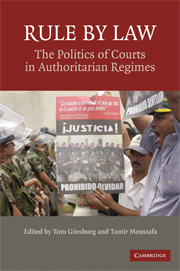Book contents
- Frontmatter
- Contents
- Contributors
- Introduction: The Functions of Courts in Authoritarian Politics
- 1 Of Judges and Generals: Security Courts under Authoritarian Regimes in Argentina, Brazil, and Chile
- 2 Administrative Law and the Judicial Control of Agents in Authoritarian Regimes
- 3 Singapore: The Exception That Proves Rules Matter
- 4 Agents of Anti-Politics: Courts in Pinochet's Chile
- 5 Law and Resistance in Authoritarian States: The Judicialization of Politics in Egypt
- 6 Courts Out of Context: Authoritarian Sources of Judicial Failure in Chile (1973–1990) and Argentina (1976–1983)
- 7 Enforcing the Autocratic Political Order and the Role of Courts: The Case of Mexico
- 8 The Institutional Diffusion of Courts in China: Evidence from Survey Data
- 9 Building Judicial Independence in Semi-Democracies: Uganda and Zimbabwe
- 10 Judicial Power in Authoritarian States: The Russian Experience
- 11 Courts in Semi-Democratic/Authoritarian Regimes: The Judicialization of Turkish (and Iranian) Politics
- 12 Judicial Systems and Economic Development
- 13 Courts in Authoritarian Regimes
- References
- Index
2 - Administrative Law and the Judicial Control of Agents in Authoritarian Regimes
Published online by Cambridge University Press: 05 June 2012
- Frontmatter
- Contents
- Contributors
- Introduction: The Functions of Courts in Authoritarian Politics
- 1 Of Judges and Generals: Security Courts under Authoritarian Regimes in Argentina, Brazil, and Chile
- 2 Administrative Law and the Judicial Control of Agents in Authoritarian Regimes
- 3 Singapore: The Exception That Proves Rules Matter
- 4 Agents of Anti-Politics: Courts in Pinochet's Chile
- 5 Law and Resistance in Authoritarian States: The Judicialization of Politics in Egypt
- 6 Courts Out of Context: Authoritarian Sources of Judicial Failure in Chile (1973–1990) and Argentina (1976–1983)
- 7 Enforcing the Autocratic Political Order and the Role of Courts: The Case of Mexico
- 8 The Institutional Diffusion of Courts in China: Evidence from Survey Data
- 9 Building Judicial Independence in Semi-Democracies: Uganda and Zimbabwe
- 10 Judicial Power in Authoritarian States: The Russian Experience
- 11 Courts in Semi-Democratic/Authoritarian Regimes: The Judicialization of Turkish (and Iranian) Politics
- 12 Judicial Systems and Economic Development
- 13 Courts in Authoritarian Regimes
- References
- Index
Summary
Authoritarian regimes, like all governments, face the need to control lower level officials who work for the regime. But authoritarian and democratic governments differ in the sets of tools and constraints they bring to the problem, and even within the category of authoritarian governments there are substantial differences in regime capabilities in this regard. This chapter examines the causes and consequences of a decision by an authoritarian government to turn to administrative law as a tool for monitoring government officials.
Administrative law is a notoriously fluid area of law, in which national regimes vary, and there is substantial divergence even over the conceptual scope of the field, much more so than, say, in corporate law or tort law. Part of the confusion comes from the fact that administrative law regimes address three different but fundamental political problems. The first is the problem of coordination among the large number of governmental actors that compose and serve the regime. This problem is addressed by the formal conception of administrative law as encompassing the organization of government; that is, the organic acts establishing and empowering government agencies. This was the definition of administrative law in the former Soviet Union, for example. Administrative law in this conception was not at all about constraint of government but about empowerment of government within a framework of legality, and ensuring that the agency has been properly granted powers from the lawmaker. By defining the scope of authority, the law resolves potential coordination problems among governmental actors.
- Type
- Chapter
- Information
- Rule by LawThe Politics of Courts in Authoritarian Regimes, pp. 58 - 72Publisher: Cambridge University PressPrint publication year: 2008
- 18
- Cited by

